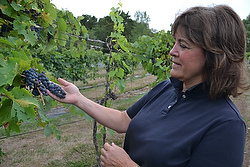Despite drought, Iowa wineries expect good grapes for altar wines
August 28, 2012
Catholic News Service
DURANGO, Iowa — As summer winds down, vineyards across Iowa are now harvesting this year’s “fruit of the vine.” Despite the worst drought in recent memory, growers foresee a good crop, mostly because grape vines can thrive without much moisture.

The chance that some of these locally grown grapes will provide the altar wine used during Masses in the Dubuque Archdiocese is better than ever.
Stone Cliff Winery, located in Durango, is one of the first wine producers in the state. It currently supplies about seven churches with altar wine. Driving down neat leafy rows in a small motorized cart, co-owner Nan Smith, who started Stone Cliff with her husband Bob about 15 years ago, recently inspected the sugar content of hanging grapes with a tiny hand-held device.
“(Altar wine) is something we got into later on,” said Smith. “The priest (at St. Joseph in Rickardsville) came to us and said, ‘We feel like we should support you.'”
The couple now sells a version of their altar wine to the public under a label called “Purple Cow.”
The number of wine producers in Iowa has grown from less than 10 a decade ago to about 90 today, according to the Iowa Wine Growers Association. Not just any wine will do for the Eucharist, however. The Catholic Church has specific requirements for sacramental wine.
“(Altar wine) must be at least 6 percent alcohol and not more than 18 percent,” explained Deacon Gerald Jorgensen of the Church of the Resurrection in Dubuque. “It must be made from grapes. It must be naturally fermented with no additives.”
Because many wines have added sugar or other ingredients, they don’t qualify for use, according to Deacon Jorgensen. Church law bases altar wine requirements on the natural fermentation process and on the fact that Christ used wine made from grapes at the Last Supper. Along with the bread used at Mass, altar wine is very important because of “transubstantiation,” which takes place at the consecration.
“(Catholics) believe that the bread and wine become the body and blood of Christ,” said Deacon Jorgensen. “They maintain the same physical characteristics, but they have been changed essentially.”
For many centuries, wine was not offered to worshipers at Mass because of a lack of resources and/or existing customs. That began to change after the Second Vatican Council. The church teaches that a person can receive the bread or wine and still have fully participated in the Eucharist.
Before vineyards existed in Iowa, churches had to purchase mostly California wines through religious supply or liquor stores. Because most churches must buy much larger quantities than an individual, state law allows clergy of any religious denomination to buy or serve sacramental wine without a license.
As Iowa winemaking began to boom in the 2000s, many Catholics wanted to support local agriculture for moral reasons. Jim Carroll, a lay Catholic now living in Dubuque, took it upon himself to research where in Iowa altar wine is produced.
“Supporting local farms fits with the Catholic social justice movement,” said Carroll. “Buying locally supports the local economy.”
Carroll got the idea for compiling a list of Iowa altar winemakers in 2008 after major floods got him thinking about how parishes would get suitable altar wines in an emergency.
Many local family-owned wine producers have unique relationships with parishes. In Ackley, for example, Eagle City Winery, based in Iowa Falls, donates all the altar wine used by St. Mary’s Parish because its owners, Ken and Carolyn Groninga, are members.
“(Eagle City) is the third winery to open in Iowa,” said Ken Groninga. “I opened 12 years ago. I was retired and looking for something to do.”
In return for the donations, parish volunteers help out the retired couple.
“In the fall, our youth come out and pick the grapes,” said Jolene Harms, St. Mary’s director of religious education.
Even many larger vineyards and wineries have strong ties to the community around them. Dave Cushman, the general manager of Park Farm Winery in Bankston, says his family started a vineyard in 2001 and began producing wine in 2005. He began making altar wine because of a connection to St. Columbkille’s Parish in Dubuque.
“My parents are members of St. Columbkille’s,” said Cushman. “I always like to think of wine as more than just an alcoholic beverage.”
Park Farm Winery now also provides altar wine for other parishes in Dubuque, including Holy Ghost, Holy Trinity and Sacred Heart churches, as well as the Church of the Nativity.
The explosion of new winemakers in Iowa has slowed down since peaking in 2006. Although grapes are a relatively recent addition, many area farmers, including the owners of Prairie Moon Winery near Ames, which also produces altar wine, believe the Iowa wine industry has created roots in the state that are as strong as the vines they plant.
“In Iowa, we can grow anything,” said Matt Nissen of Prairie Moon Winery. “The drought doesn’t affect the grapes. Their roots go down 10 feet.”













